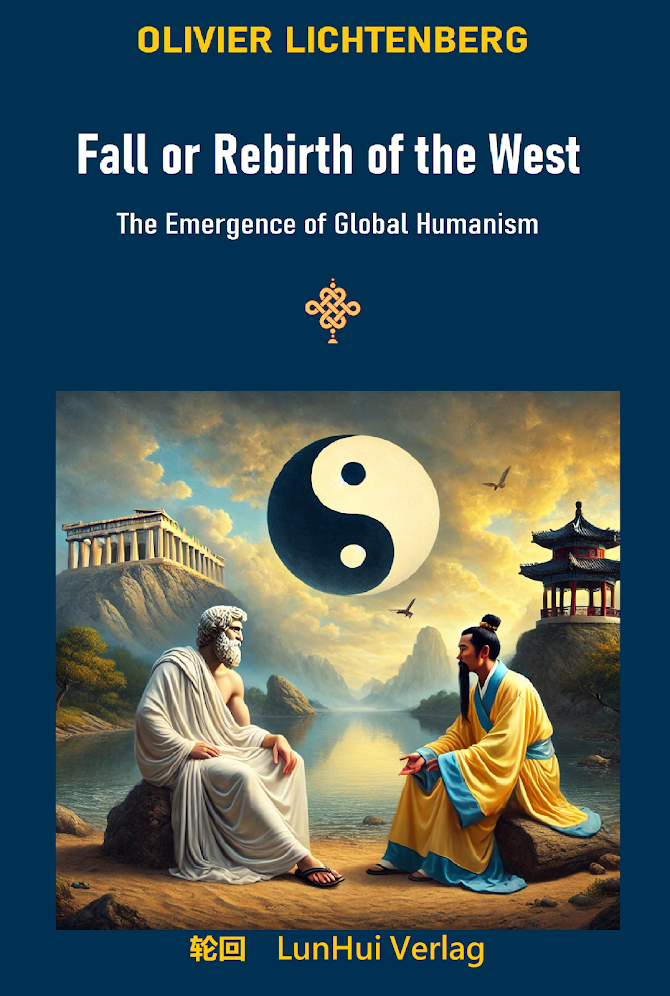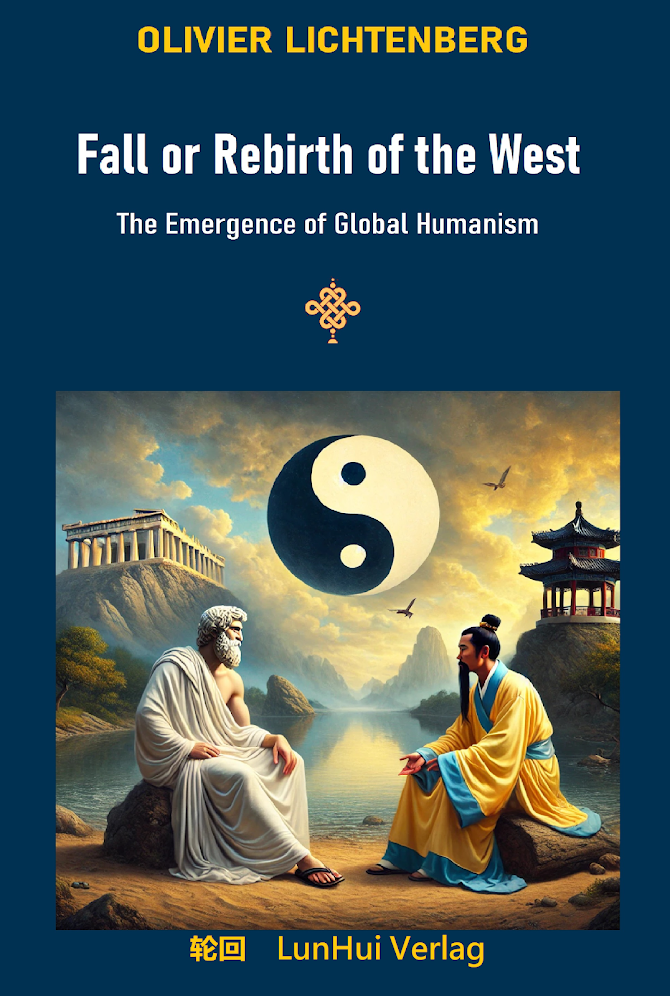
Fall or Rebirth of the West: The Emergence of Global Humanism
Fall or Rebirth of the West: The Emergence of Global Humanism is an ambitious and deeply interdisciplinary inquiry into the historical and philosophical divergence between the Western and Eastern worlds—and a call for a new civilizational synthesis.
Olivier Lichtenberg traces the roots of modern global tensions to a fundamental split between two civilizational epistemologies, beginning with ancient Greece and China. This divergence is not merely cultural or political, but ontological and epistemic—grounded in radically different ways of knowing, being, and organizing human life. Where Western thought, inspired by Heraclitus, came to emphasize flux, conflict, individual autonomy, and analytical mastery, Eastern philosophy—exemplified by Laozi—developed around notions of harmony, balance, relational identity, and attunement with nature.
The book unfolds in three main parts. The first part explores the historical foundations of this divergence, beginning with a comparative study of material conditions, economic structures, and early philosophical developments in Greece and China. It shows how differing geographic, economic, and political contexts fostered distinct ontologies. Greek city-states, shaped by trade and fragmentation, produced a worldview of dualism, abstraction, and competitive individualism. Chinese civilization, rooted in agrarian stability and bureaucratic order, cultivated a more holistic, integrative, and cyclical view of life.
The second part examines the modern implications of this epistemological divide. From Enlightenment rationalism to the scientific revolution and capitalist industrialization, the West’s epistemology matured into a powerful system of technological and economic control. But it also gave rise to alienation, ecological degradation, and what the author calls the “schizophrenia of the West”—a profound inner split between meaning and efficiency, ethics and economics, being and doing. Meanwhile, Eastern societies, though increasingly modernized, still wrestle with reconciling inherited traditions of harmony and social ethics with imported Western frameworks of development and progress.
Rather than treating this divergence as permanent or oppositional, Lichtenberg argues that the current global crisis—ecological, existential, cultural—demands a new phase of integration.
Drawing on thinkers such as Leibniz, Iain McGilchrist, Paul Mus, Tran Duc Thao, and others, the author maps the intellectual terrain necessary to bridge these paradigms. The key lies not in compromise but in a dialectical synthesis: an emergence of Global Humanism that honors the depth of both traditions while transcending their limitations.
In the third part, the book turns toward implementation and integration. It outlines practical paths toward a cross-cultural philosophical and ethical renewal, including education, governance, technological development, and economic systems that combine Western analytical clarity with Eastern relational wisdom. The final chapters introduce the concept of the Ethossphere—a speculative but grounded vision of an emergent, global ethical awareness that goes beyond the mere cognitive layer of global consciousness (the Noosphere) and aims toward a shared, dialogical ethos capable of navigating our complex planetary future.
Written in a sober, lucid style, Fall or Rebirth of the West is both diagnosis and proposition. It is not nostalgic for a lost past nor utopian about the future. It recognizes the achievements and limits of both East and West, and offers a framework for mutual recognition and synthesis. More than a philosophical treatise, it is a civilizational reflection aimed at readers who sense that the challenges of our time—climate change, social fragmentation, ethical disorientation—cannot be solved by the same paradigms that created them. At once analytical and visionary, rooted in history yet oriented toward the future, this book invites us to consider not only where we have come from, but where—and how—we might still go.
Recente bijdragen
Interview with Olivier Lichtenberg – The Emergence of Global Humanism
Interview with Olivier Lichtenberg – About the book “Fall or Rebirth of the West” Today we discuss with Olivier Lichtenberg his […]
Alle auteurs
- Olivier Lichtenberg
- ADHD
- Advice from the doctor
- African poetry
- AIDS activism and gay emancipation
- Bibliography of Chris
- Bibliography of Olivier
- Biography of Chris
- Biography of Olivier
- Biography of Patrick
- Blogs
- Chris' Stage
- Columns
- Covid
- Dirk van Babylon Newsletter
- Double calling
- Essays
- Fragile light
- Hanna's Mind Wanderings
- Incapacity for work
- Late Pasquino's
- LEIF doctor
- Liechtensteiner
- Medical newsletter
- Memoirs of a general practitioner
- Miguel Molinos
- Moctines
- Musings
- Myriad
- Practice in Erembodegem
- Resignation
- Sleep problems
- Sonnets
- Sprawl Month
- Substance abuse and addiction
- Travel
- Uncategorized
- Vi to
- Vögels
- Voluntary euthanasia
- Weltschmerz
- Wormwood or The dose makes the poison
- Patrick Bernauw
- ADHD
- Advice from the doctor
- African poetry
- AIDS activism and gay emancipation
- Bibliography of Chris
- Bibliography of Olivier
- Biography of Chris
- Biography of Olivier
- Biography of Patrick
- Blogs
- Chris' Stage
- Columns
- Covid
- Dirk van Babylon Newsletter
- Double calling
- Essays
- Fragile light
- Hanna's Mind Wanderings
- Incapacity for work
- Late Pasquino's
- LEIF doctor
- Liechtensteiner
- Medical newsletter
- Memoirs of a general practitioner
- Miguel Molinos
- Moctines
- Musings
- Myriad
- Practice in Erembodegem
- Resignation
- Sleep problems
- Sonnets
- Sprawl Month
- Substance abuse and addiction
- Travel
- Uncategorized
- Vi to
- Vögels
- Voluntary euthanasia
- Weltschmerz
- Wormwood or The dose makes the poison
Over de auteur
Contacteer de auteursOther works by our writers
- November 2025 (1)
- August 2025 (1)
- July 2025 (2)
- March 2025 (3)
- December 2024 (10)
- November 2024 (6)
- October 2024 (3)
- February 2021 (3)
- January 2021 (5)

No comments have been posted yet!